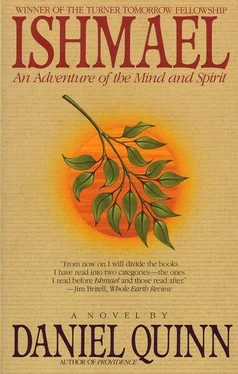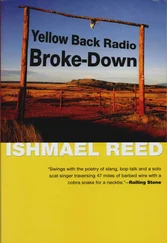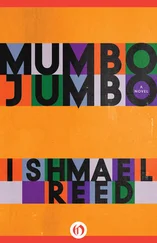“We can thumb our noses at them.”
“Exactly.”
“All the same, Bwana, what are we to do with this food if we don’t need it?”
“You save it! You save it to thwart the gods when they decide it’s your turn to go hungry. You save it so that when they send a drought, you can say, ‘Not me , goddamn it! I’m not going hungry, and there’s nothing you can do about it, because my life is in my own hands now!’ ”
Ishmael nodded, abandoning his hunter–gatherer role. “So your lives are now in your own hands.”
“That’s right.”
“Then what are you all so worried about?”
“What do you mean?”
“If your lives are in your own hands, then it’s entirely up to you whether you go on living or become extinct. That’s what this expression means, isn’t it?”
“Yes. But obviously there are still some things that aren’t in our hands. We wouldn’t be able to control or survive a total ecological collapse.”
“So you’re not safe yet. When will you finally be safe?”
“When we’ve taken the whole world out of the hands of the gods.”
“When the whole world is in your own, more competent, hands.”
“That’s right. Then the gods will finally have no more power over us. Then the gods will have no more power over anything . All the power will be in our hands and we’ll be free at last.”
“Well,” Ishmael said, “are we making progress?”
“I think so.”
“Do you think we’ve found the root of your revulsion toward the sort of life that was lived in prerevolutionary times?”
“Yes. Far and away the most futile admonition Christ ever offered was when he said, ‘Have no care for tomorrow. Don’t worry about whether you’re going to have something to eat. Look at the birds of the air. They neither sow nor reap nor gather into barns, but God takes perfect care of them. Don’t you think he’ll do the same for you?’ In our culture the overwhelming answer to that question is, ‘Hell no!’ Even the most dedicated monastics saw to their sowing and reaping and gathering into barns.”
“What about Saint Francis?”
“Saint Francis relied on the bounty of farmers, not the bounty of God. Even the most fundamental of the fundamentalists plug their ears when Jesus starts talking about birds of the air and lilies of the field. They know damn well he’s just yarning, just making pretty speeches.”
“So you think this is what’s at the root of your revolution. You wanted and still want to have your lives in your own hands.”
“Yes. Absolutely. To me, living any other way is almost inconceivable. I can only think that hunter–gatherers live in a state of utter and unending anxiety over what tomorrow’s going to bring.”
“Yet they don’t. Any anthropologist will tell you that. They are far less anxiety–ridden than you are. They have no jobs to lose. No one can say to them, ‘Show me your money or you don’t get fed, don’t get clothed, don’t get sheltered.’ ”
“I believe you. Rationally speaking, I believe you. But I’m talking about my feelings, about my conditioning. My conditioning tells me—Mother Culture tells me—that living in the hands of the gods has got to be a never–ending nightmare of terror and anxiety.”
“And this is what your revolution does for you: It puts you beyond the reach of that appalling nightmare. It puts you beyond the reach of the gods.”
“Yes, that’s it.”
“So. We have a new pair of names for you. The Takers are those who know good and evil, and the Leavers are… ?”
“The Leavers are those who live in the hands of the gods.”
Along about three o’clock, the rain stopped and the carnival yawned, stretched, and went back to work separating the rubes from their money. At loose ends once again, I hung around for a while, let myself be separated from a few bucks, and finally had the idea of tracking down Ishmael’s owner. This turned out to be a hard–eyed black man named Art Owens, who was five and a half feet tall and spent more time lifting weights than I do at the typewriter. I told him I was interested in buying his gorilla.
“Is that a fact,” he said, not scornful, not impressed, not interested, not anything.
I told him it was and asked how much it would take.
“Would take about three thousand.”
“I’m not that interested.”
“How interested are you?” Just curious, not seriously interested himself.
“Well, more like a thousand.”
He sneered—just a little, almost politely. For some reason, I liked this guy. He was the type who has a law degree from Harvard stuck away in a drawer somewhere because he never found anything to do with it that appealed to him.
I told him: “This is a very, very old animal, you know. He’s been here since the thirties.”
This got his attention. He asked how I happened to come by that piece of information.
“I know the animal,” I replied briefly, as if I might know thousands more like him.
“Might go twenty–five hundred,” he said.
“Trouble is, I don’t have twenty–five hundred.”
“See, I already got a painter in New Mexico workin’ on a sign for me,” he said. “Paid him two hundred in advance.”
“Uh huh. I could probably raise fifteen hundred.”
“Don’t see how I could go below twenty–two, that’s a fact.”
The fact was, if it was right there in my hand, he’d be delighted to take two thousand. Maybe even eighteen hundred. I said I’d think about it.
It was a Friday night, so the suckers didn’t start going home till after eleven and my senectuous bribee didn’t come round to collect his twenty dollars till midnight. Ishmael was asleep sitting up, still bundled up in his blankets, and I didn’t feel any qualms about waking him; I wanted him to reassess the charms of the independent life.
He yawned, sneezed twice, cleared his throat of a mass of phlegm, and fixed me in a bleary, malevolent glare.
“Come back tomorrow,” he said in the equivalent of a mental croak.
“Tomorrow’s Saturday—hopeless.”
He wasn’t happy about it, but he knew I was right. He managed to put off the inevitable by laboriously rearranging himself, his cage, and his blankets. Then he settled down and gave me a look of loathing.
“Where did we leave off?”
“We left off with a new pair of names for the Takers and the Leavers: Those who know good and evil and those who live in the hands of the gods.”
He grunted.
“What happens to people who live in the hands of the gods?”
“What do you mean?”
“I mean, what happens to people who live in the hands of the gods that does not happen to people who build their lives on the knowledge of good and evil?”
“Well, let’s see,” I said. “I don’t suppose this is what you’re getting at, but this is what comes to mind. People who live in the hands of the gods don’t make themselves rulers of the world and force everyone to live the way they live, and people who know good and evil do.”
“You’ve turned the question round back to front,” said Ishmael. “I asked what happens to people who live in the hands of the gods that doesn’t happen to those who know good and evil, and you told me just the opposite: what doesn’t happen to people who live in the hands of the gods that does happen to those who know good and evil.”
“You mean you’re looking for something positive that happens to people who live in the hands of the gods.”
Читать дальше
Конец ознакомительного отрывка
Купить книгу












